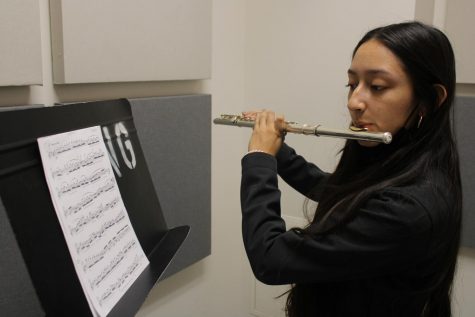Junior progresses forward with diabetes
May 11, 2016
Junior James Garrett was diagnosed with Type 1 Diabetes at a young age. Both sides of his family carry the disease.
Insulin is a hormone produced in the pancreas that regulates glucose in the blood. However, a lack of insulin production can cause Type 1 diabetes, while not having enough insulin for the amount of glucose present in the body could cause Type 2.
“I was diagnosed after my fifth birthday,” Garett said. “I took a blood test and a ketone test, which is just a urine test for my kidneys.”
Ever since he was young, Garrett said he received support from his family because his mom, dad, sister and grandparents also have diabetes. They told him to “join the club.” Despite the support he had while getting accustomed to having diabetes, he had a problem with knowing how much insulin to take and when to take it in a given situation.
“I had a lot of time to get used to it, since I got it at an early age,” Garrett said. “Back then, it was a little bit of a hassle. When I first started, I didn’t know how to control my blood sugar, [so it] would go low, high, all over the place and I did not understand. I got on a regimen of insulin every day, but when I started I didn’t know how much I was supposed to be taking. So it was a hit and miss, trial by error. We monitored [the insulin intake], but we had to see what [each amount] did. If it was too much, we did less.”
As he got older, his understanding of his condition grew. He knew how much insulin to take when his blood sugar would get too high. He also memorized the nutritional values of school lunches to help him with managing his levels.
“If [my blood sugar] goes low, I start feeling almost like I’m high,” Garrett said. “Like my legs feel like jelly, everything is all airy and bright. If it’s too high, I just feel sick. I feel like throwing up. When I used to go to the nurse’s office, they would have a list of how many carbs were in the food and stuff, but now I have it almost memorized.
He said as he got older, his blood sugar became more unstable, compared to what it used to be.
“I think now it’s a little more extreme,” Garrett said. “Now, [my levels] can go really high or really low, quicker now. It used to be more stable, but now as I have grown older, especially at this age, it’s unstable. It should get better as I get older.”
Garrett said his friends do not treat him differently, and they make light-hearted jokes about having diabetes. He thinks it would be nice to have a diabetic friend, to have someone else to relate to besides family.
“They would feel what I feel, know what I am going through,” Garrett said.
Garrett said that having diabetes has gotten him out of class when his blood sugar was too low. However, diabetes has also gotten in the way of Garrett’s participation in marching band and desire to donate to the blood drive.
“There were a couple of times during marching band when I couldn’t march, because my blood sugar was too high,” Garrett said. “So I had to wait and take my insulin, and I missed marching on the field. One time, I was signing up to do a blood drive here, [but then] I was like ‘I have diabetes; I can’t really donate blood.’”
Garrett said that while he struggled with school (especially during lunch periods, because he has to apply his insulin), having the responsibility of maintaining his glucose has taught him how to multi-task. In the future, he said he will gain an even better sense of responsibility. Having diabetes changed his outlook on life.
“I think in the future, it can really help me be persistent in different hardships, because I am enduring right now,” Garrett said. “On top of responsibilities I usually have at school, I also have to take care of my diabetes. So I have to make sure I take insulin and check what I am eating. I have more and more stuff to look out for. It makes me feel more positive on my outlook on life, because I have been able to keep going and be persistent.”






